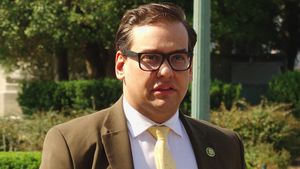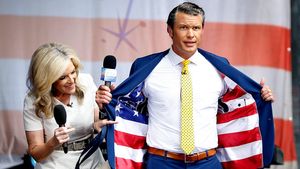The University of Southern California is known for being an LGBT friendly school, but this year its allies have decided to kick things up a notch. Their fearless leader is junior Emily Allen, the first ever ally elected as executive director of the GLBT Assembly, which has since been named the Queer and Ally Student Assembly. Allen, whose two siblings are gay and lesbian, has always been a passionate supporter of equality, and hopes to spread her love and enthusiasm across USC. Between a hugely successful Ally Week and the Coming Out as an Ally Project, it’s safe to say she’s already doing a fantastic job.
How did you first get involved with USC’s GLBT Assembly (now the Queer and Ally Assembly)?
As a freshman I was trying to find my niche at USC, and I decided to go to the Barbequeer- the welcome back barbecue for the LGBT/ally community. I was also involved in JAGS, the Jewish Alliance of Gays and Straights, and I became president as a sophomore. Being president of JAGS caused me to be on the executive board of the LGBT society, and so I decided to try out for the executive director position.
What’s it like being the first ally elected as executive director?
It is a big honor. It honestly doesn’t feel that different for me, because there was no hesitation, nobody telling me that they didn’t think that I could do it because I was an ally. I get to bring in another part of the community that may be unsure of whether or not they can participate. They can be more comfortable coming to our events knowing that there’s an ally in charge, because they know that our assembly encompasses a wide span of people.
So you haven’t received any negative backlash?
No, no negativity. That never came up as an issue because I was hardworking, I was trusted, and I was already part of the community. The only way it was made a big deal was by our school press, which actually drew more attention to the group. But within the assembly and my executive board, it was as if a queer person had taken charge.
More on next page...
\\\
(continued)
Why is this effort so important to you?
Most of the people who are close to me are LGBT. My sister is a lesbian, my brother’s gay, and most of my best friends are gay too so I always grew up in my own mini LGBT community at home. It was very important to me to bring this comfortable community I had in my personal life to my school life and to a larger crowd. It’s also hugely important to me to include not only people who are comfortable with their identity and eager to get involved -- those people already come regardless. But I want to make sure we include the people who are unsure of their identity or maybe not ready to come out, who maybe just came out and need to acclimate themselves in the community, or allies like me. Those are the people who I really want to emphasize can come join us.
What went into the decision to name the society QuASA (Queer and Ally Student Assembly)?
The conversation started in a pervious year by my predecessor, and she introduced it because “queer” seemed more inclusive of the community. It was between “Queer Student Assembly” and “Queer and Ally Student Assembly,” and I really fought for QuASA because if I was going to be leading it, I wanted to be represented in it.
Also, if it was just the Queer Student Assembly, then allies might not feel like a part of the organization. I want people to come who were having trouble coming out or are questioning their identity. If they come in as allies then they can join QuASA comfortably and then transition with they’re ready. Some people are still uncomfortable with the word “queer,” but it’s been a word that we’ve reclaimed, so we’re introducing that. So many letters get added to LGBT every day, and this way nobody’s left out.
What is the Coming Out as an Ally project?
The Coming Out as an Ally project is something I dreamed up one day. All it is is people taking pictures of themselves holding a sign that says “I am an ally,” and I thought it would be nice to see in a visual representation all of the wonderful allies we have.
We made our own huge sign that we took around to different organizations on campus and sometimes we sat on the side of a busy footpath street and people would come up to us and take a picture with the sign. They could also make their own sign and take a picture on their computer camera.
We did most of our communicating on Facebook, and we had everyone upload their pictures there. We did this for about a month starting in September and then we collected them all during our Coming Out Month this October. This year I also implemented an Ally Week as part of Coming Out month to honor people who came out as an ally. There’s more to being an ally than just inwardly supporting the LGBT community. It’s about speaking out about it, and that’s what this whole project is -- about who felt comfortable enough to proclaim it for the public to see.
More on next page...
\\\
(continued)
Did you get a lot of support from USC?
It started out slowly -- I emailed a lot of different organizations at school asking if they’d want to participate in the Coming Out as an Ally project and some responded, so I would spend nights going around to different organizations’ meetings with a big sign.
However, the project started picking up after the teen suicides because people really felt like they wanted to do something about it, and here was something they could do. We aimed to get a thousand pictures and we got over a thousand -- not just of people from USC but from people all over.
It was a way for QuASA to introduce itself to a whole bunch of organizations on campus, and if you look at the Facebook group, it’s a big collection of all different types of people. We took pictures of improv groups, a capella groups and the whole Pan-Hellenic society, which is in charge of Greek life, got on board. They even made t-shirts for Ally Week that said “Gay? Fine by Greeks” on it.
Eventually, people started to know what we were and wanted to take pictures themselves. Of course, I wasn’t the only one involved -- everybody pitched in. There were some people who got 20, 30, 50 pictures from their offices. We made a big collage of the pictures and put it up on display on big boards. It was a big community effort and it’s really inspiring to look through the pictures. I think it made a really big impact, and if it could get this big the first year, it’s something I want to keep on doing in the future. I really want it to go national too -- I want it to become a countrywide thing so people can go to this Facebook group and upload their pictures.
There have been several suicides in the LGBT community due to bullying. What has USC and QuASA done in response and what would you like to do to help students who may be suffering from bullying?
USC hosted a town hall meeting to talk about the suicides and discuss all the resources we have. We were named one of the top LGBT friendly schools in the nation, and we have a whole LGBT resource center which includes peer mentoring programs where less comfortable students can pair up with more acclimated student. We have ally training for faculty where they can be trained to help questioning and troubled LGBT youth, and we also have scholarships for LGBT students.
QuASA itself is more of a programming aspect, but I personally just want to keep doing things like the ally project, because that is more of a shout saying, “Look at all these people who do support you. Even if there’s somebody that gives you a hard time about your sexuality, look at all these thousands of people that you can turn to and all of these smiling friendly faces that are proud to support you!” I’m very grateful to be a part of QuASA at USC. It’s a great school to be queer and an ally!
Follow SheWired on Twitter!
Follow SheWired on Facebook!
Be SheWired's Friend on MySpace!





























































































































